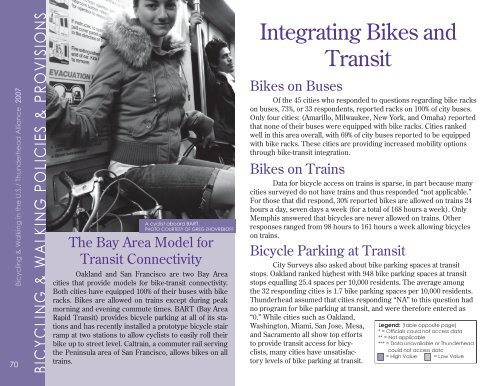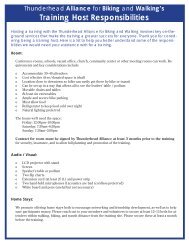2007 Benchmarking Report - Alliance for Biking & Walking
2007 Benchmarking Report - Alliance for Biking & Walking
2007 Benchmarking Report - Alliance for Biking & Walking
Create successful ePaper yourself
Turn your PDF publications into a flip-book with our unique Google optimized e-Paper software.
Bicycling & <strong>Walking</strong> in the U.S./ Thunderhead <strong>Alliance</strong> <strong>2007</strong><br />
70<br />
BICYCLING & WALKING POLICIES & PROVISIONS<br />
A cyclist aboard BART.<br />
PHOTO COURTESY OF GREG ZHOVREBOFF<br />
The Bay Area Model <strong>for</strong><br />
Transit Connectivity<br />
Oakland and San Francisco are two Bay Area<br />
cities that provide models <strong>for</strong> bike-transit connectivity.<br />
Both cities have equipped 100% of their buses with bike<br />
racks. Bikes are allowed on trains except during peak<br />
morning and evening commute times. BART (Bay Area<br />
Rapid Transit) provides bicycle parking at all of its stations<br />
and has recently installed a prototype bicycle stair<br />
ramp at two stations to allow cyclists to easily roll their<br />
bike up to street level. Caltrain, a commuter rail serving<br />
the Peninsula area of San Francisco, allows bikes on all<br />
trains.<br />
Integrating Bikes and<br />
Bikes on Buses<br />
Transit<br />
Of the 45 cities who responded to questions regarding bike racks<br />
on buses, 73%, or 33 respondents, reported racks on 100% of city buses.<br />
Only four cities: (Amarillo, Milwaukee, New York, and Omaha) reported<br />
that none of their buses were equipped with bike racks. Cities ranked<br />
well in this area overall, with 69% of city buses reported to be equipped<br />
with bike racks. These cities are providing increased mobility options<br />
through bike-transit integration.<br />
Bikes on Trains<br />
Data <strong>for</strong> bicycle access on trains is sparse, in part because many<br />
cities surveyed do not have trains and thus responded “not applicable.”<br />
For those that did respond, 30% reported bikes are allowed on trains 24<br />
hours a day, seven days a week (<strong>for</strong> a total of 168 hours a week). Only<br />
Memphis answered that bicycles are never allowed on trains. Other<br />
responses ranged from 98 hours to 161 hours a week allowing bicycles<br />
on trains.<br />
Bicycle Parking at Transit<br />
City Surveys also asked about bike parking spaces at transit<br />
stops. Oakland ranked highest with 948 bike parking spaces at transit<br />
stops equalling 25.4 spaces per 10,000 residents. The average among<br />
the 32 responding cities is 1.7 bike parking spaces per 10,000 residents.<br />
Thunderhead assumed that cities responding “NA” to this question had<br />
no program <strong>for</strong> bike parking at transit, and were there<strong>for</strong>e entered as<br />
“0.” While cities such as Oakland,<br />
Washington, Miami, San Jose, Mesa,<br />
and Sacramento all show top ef<strong>for</strong>ts<br />
to provide transit access <strong>for</strong> bicyclists,<br />
many cities have unsatisfactory<br />
levels of bike parking at transit.<br />
Legend: (table opposite page)<br />
* = Offi cials could not access data<br />
** = Not applicable<br />
*** = Data unavailable or Thunderhead<br />
could not access data<br />
= High Value = Low Value



